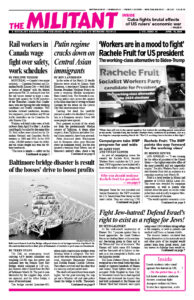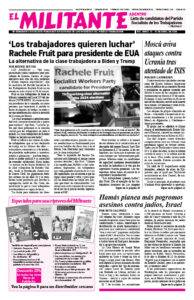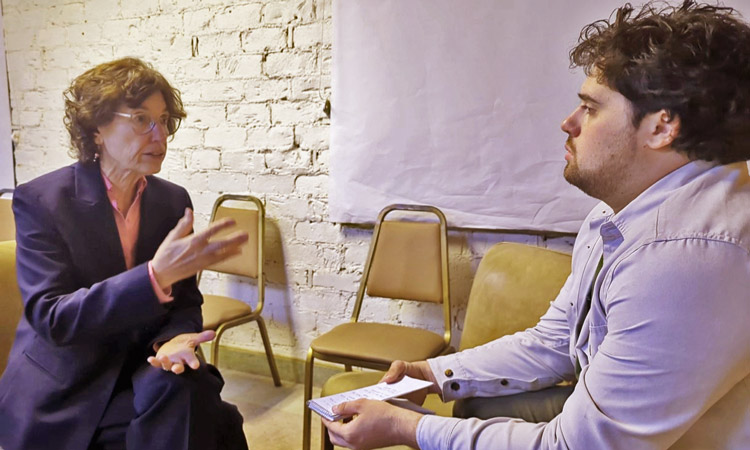Bunker King goes to Santa Monica College and is an editor at the Corsair, the student newspaper. He attended the March 30 talk by Rachele Fruit, SWP candidate for president, and interviewed her afterwards. These were some of the exchanges, recorded by Mary Martin.
Corsair: How did the SWP choose you to be the presidential candidate?
Rachele Fruit: I was the SWP candidate for U.S. Senate from Florida. We responded immediately to the Oct. 7 pogrom by joining a protest of thousands in Miami, explaining what was at stake for the working class.
We explained our party’s longstanding communist continuity in fighting Jew-hatred, going back to Lenin and the Russian Revolution. We said that the establishment of Israel became inevitable when the countries of “democratic” imperialism closed their doors to the victims of the Holocaust, and the Stalinist rulers of the Soviet Union prevented the workers of Germany from uniting to defeat Hitler.
We said Israel has to exist as a refuge for the Jews facing threats and persecution anywhere in the world. And we said that those “socialists” who support Hamas will find themselves allied with future fascist forces.
A photo of me talking to the press at this protest appeared on the front page of the Militant.
Corsair: It’s a great picture, by the way. Why should people vote for a third-party candidate?
Fruit: The Socialist Workers Party is a working-class party, not a “third” party. All the so-called third parties today support capitalism. They campaign to convince working people to keep supporting the exploitative system we live under. We explain the need for a labor party based on the unions that could organize all working people to advance our interests. Those who agree should endorse and get involved in our campaign.
Corsair: Would you ever support a “first party” candidate?
Fruit: No, we would never support a politician who campaigns for capitalism.
Corsair: Bernie Sanders has been a socialist politician for a long time. What is your view of him?
Fruit: Sanders has used his reputation as a socialist to draw as many young people as he could into the Democratic Party instead of building an independent working-class movement. Now he is leading the call for a cease-fire in Gaza, supporting Hamas, a reactionary position.
Corsair: You said in your talk that the entire left is supporting Hamas, unabashedly. I think that’s a very courageous thing to say. Are you afraid that these groups will accuse you of breaking the unity of the left?
Fruit: We have no unity with the left. They are a wing of capitalist politics. We represent the interests of the working class. They support wiping Israel off the face of the map and with it the Jewish people. And they don’t support open discussion and debate. They are for shutting down any voice they don’t agree with, by force if necessary.
Corsair: I notice every time I run into your party at a demonstration, like I did at the one defending Ukraine, you all have so many books. Other parties don’t have books like that.
Fruit: These books contain our history, the history of the working class, that we need to learn from to move forward. No one else has an interest in us learning our own class history.
Corsair: You said the workers who Hillary Clinton called “deplorables,” — who I’ve seen often described as being angry and disillusioned — are in fact the potential allies of the working class and are among the people the SWP is reaching out to.
Fruit: Those so-called deplorables are working class, the force that will fight and eventually end war, oppression, exploitation and Jew-hatred by making a socialist revolution.
After Clinton disparaged the workers of West Virginia, one of most significant labor battles in the U.S. in decades exploded there in February 2018. Teachers and other school workers went on strike statewide, winning support from students, parents, churches and other unions. The majority were women, many from coal mining families over generations. They organized whole communities to stand together and won gains for all state workers. You can read about this struggle in the Militant and in our book, In Defense of the US Working Class, by Mary-Alice Waters.


